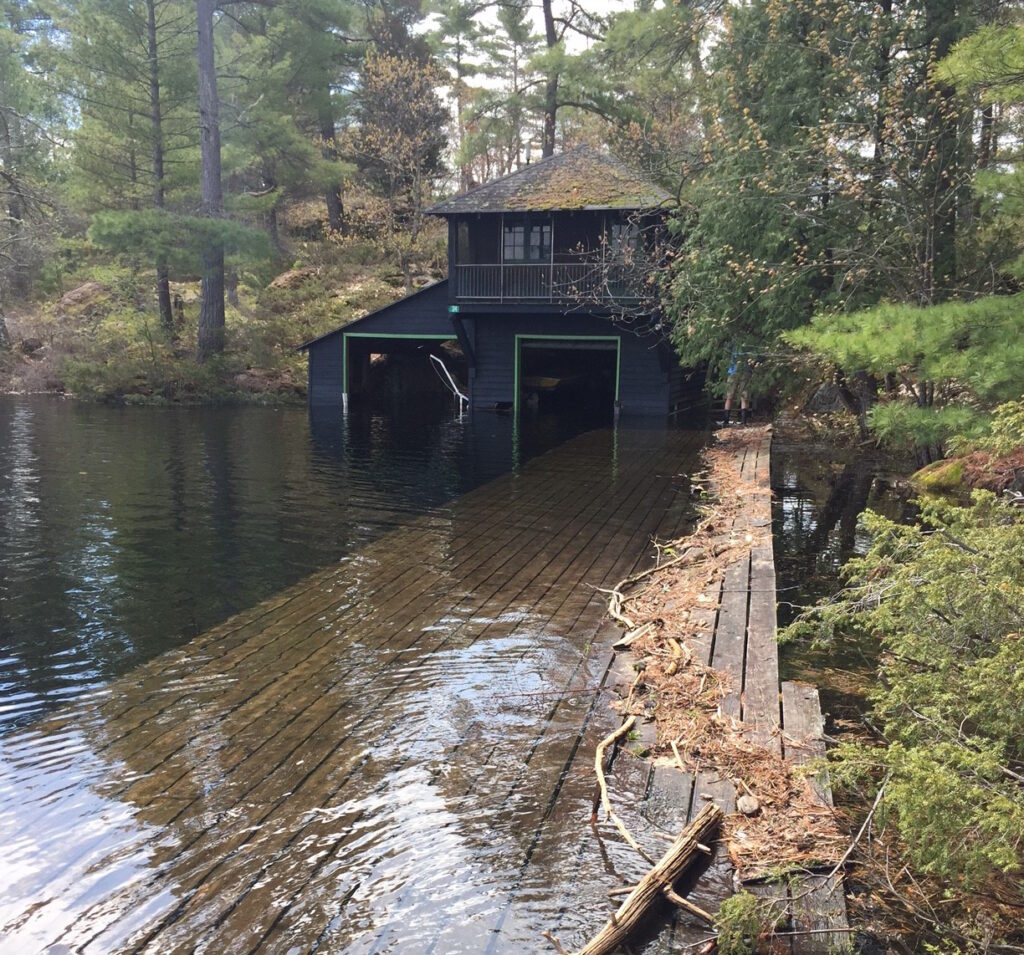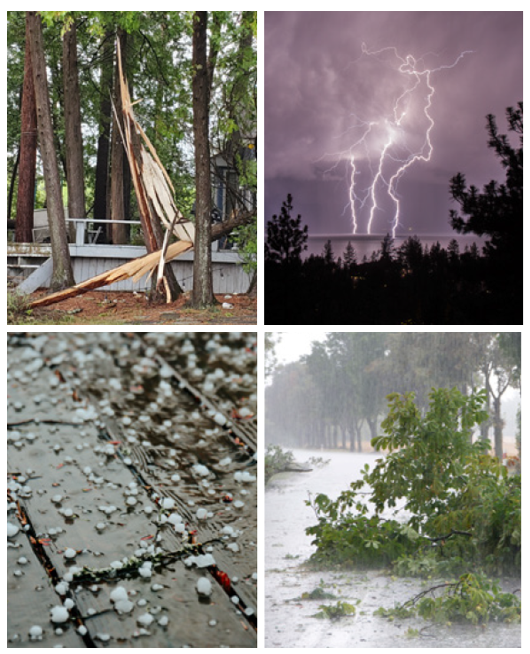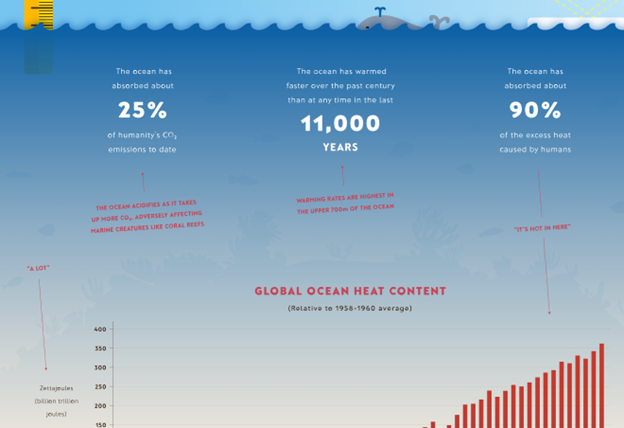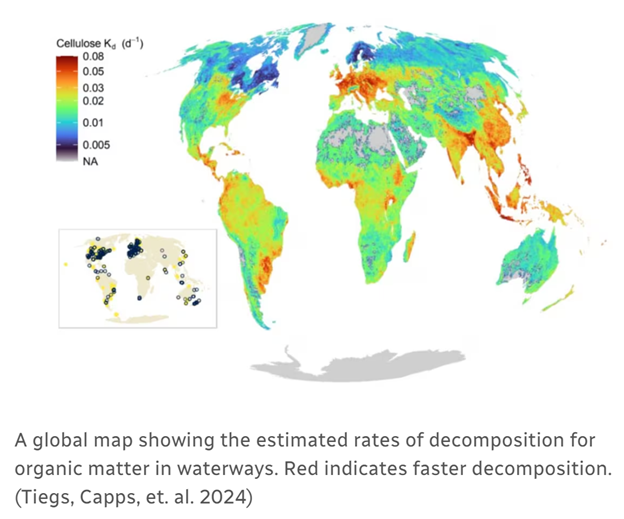
Our climate is changing, in large part from human causes.
Climate change will affect our land and water resources, our economy and ultimately our way of life; these profound impacts have obvious policy implications, and will affect our communities and all of us as individuals.
Our job as lake managers has gotten more challenging.
All of the lake and watershed protection and management activities that FOCA advocates for become more critical and important as a result of the impacts of a changing climate.

November 25, 2025 – The Intact Centre for Climate Adaptation of the University of Waterloo has released a new report: Managing Risking Risks: Climate Resilient Shorelines for Canada outlining national guidance to address growing risks from climate change, erosion, and development on coastal and freshwater shorelines



EARLIER NEWS:
January 3, 2025 – How the warming Great Lakes could herald a new era of supercharged snowstorms (Canadian Press) – an article about the late 2024 storm in Gravenhurst, and what lake-effect snowstorms will likely look like in the coming years.
July 9, 2024 – Canada draws link between June heat wave and climate change with new attribution analysis (CBC News) – “The analysis conducted by Environment and Climate Change Canada (ECCC) found that a heat wave in Ontario, Quebec and Atlantic Canada between June 17 and 20 was made two to 10 times more likely because of climate change.”
May 31, 2024 – There’s a climate threat lurking in rivers around the world. New research shows where (CBC News; source of the image at the side – click to enlarge) – New research by over 150 scientists in 40 countries including Canada has been studying the role that rivers and streams play in the global cycling of carbon.
Global warming and pollution are speeding up decomposition rates in rivers, changing them from carbon sinks to carbon sources, and sending more CO2 into the atmosphere. Human activity accelerates these impacts, for example through adding more nutrients like phosphorus and nitrogen in chemical runoff from lawn fertilizers.

We can expect more changes in our physical environment, as the impacts of a changing climate accelerate, including:
Would it still be cottage country WITHOUT the loon?

In 2014, during the United Nations climate summit in New York, FOCA’s Executive Director wrote an open letter about the impacts of a changing climate on Ontario’s lands and waters. His words are prescient:
Click to download his letter. (PDF, 2 pages)


Learn more about the impacts of our changing climate, and support those working to mitigate its impacts.
Shoreline residents are encouraged to read and share FOCA’s publication, created in conjunction with FOCA’s partners at the Ministry of Natural Resources and Forestry:
Managing Your Waterfront Property in a Changing Climate
(PDF, 3.5 MB, 20 pages)


Please note: the following is archival material, and some links to third-party resources may no longer be active.
December 2023 – Environment and Climate Change Canada reported on the extreme weather year, with Top 10 Weather Stories of 2023, including fire, flood, temperature records, tornadoes and more.
Aug 25, 2023 – Extreme weather costs are pushing rural Ontario towns to the financial brink (CBC)
August 25, 2023- Ontario’s Provincial Climate Change Impact Assessment Technical Report has been posted. Click here to access it.
Sept. 2022 – IPCC Explainer: The Science of Climate Change. Do you want to understand the latest IPCC report minus the report? View this comprehensive infographic from ECIU (Energy & Climate Intelligence Unit, UK).

Aug.29/22 – Floods, droughts, storms will cost Canadian economy $139B in next 30 years, report says (CBC) – The report, titled Aquanomics, was published by GHD, a global engineering and architecture services firm.
July 25, 2022 – Research: Lakes in hot water, climate change creating a cauldron of issues (Water Canada article by York University) – research findings from FOCA’s science colleagues, Dr. Sapna Sharma, Dr. John Smol and others.
June 13, 2022 – Biden admin: Stop flood insurance for new, risky homes https://www.eenews.net/articles/biden-admin-stop-flood-insurance-for-new-risky-homes/ (Climate Wire)
April 2022 Video Series: Climate Change in Our Backyards – In partnership with Experience Simcoe, Severn Sound Environmental Association put together a four-part video series on climate change in the Simcoe watershed, and actions municipalities are taking to adapt to and mitigate the changes.
Start here: https://youtu.be/zETwlsecTms
Above is 1 of 4 videos in the series
March 2021 – Lessons learned from the acid rain battles: Big environmental problems can be solved – John Gunn, Norman Yan and John P. Smol (Globe & Mail article, as posted to the Royal Society of Canada website)
March 2021 – the federal Ministry of Environment and Climate Change Canada (ECCC) has invited public feedback into proposed ecosystem objectives and potential phosphorus reduction scenarios, to reduce harmful algae in Lake of the Woods, after a 4-year nutrient and algae research program. Visit the dedicated webpage for more.
2021 – FOCA is pleased to be part of the District of Muskoka’s New Leaf Community Working Group, who will be identifying the local impacts of climate change, and outlining the steps to ensure we are able to appropriately prepare, adapt, and increase our resilience to these changes into the future.
FOCA is also participating in Ontario’s Provincial Climate Change Impact Assessment (PCCIA) and specifically to help assess future impacts to the People & Communities area of focus.
October 26, 2021 – Northern lakes have warmed six times faster since 1992: Research (Water Canada)
Partner Research:
Researchers at the IISD-Experimental Lakes Area have discovered much over the past half century, about the effects of climate change on lakes and freshwater.
These are not future predictions; these effects are happening already:
Part I – Our air is getting warmer
Part II – Our lakes are getting a lot less icy
Part III – Our lakes are getting darker
Part IV – Our fish are squeezing into smaller habitats
Part V – Our fish are getting smaller
A study published in 2015 analyzed 25 years of data worldwide, concluding that there is pervasive and rapid warming in freshwater lakes at rates much greater than the warming rate of either the ocean or the atmosphere. The study notes that lakes hold a large majority of Earth’s liquid freshwater, support enormous biodiversity, and provide key provisioning and cultural ecosystem services to people around the world. In the Great Lakes region (and in Northern Europe), lakes were warming significantly faster than the global average.
Since even seemingly small changes in lake temperature can profoundly affect key physical and biological processes, climate change is among the greatest threats to lakes. This study supports the urgent need to incorporate climate impacts into vulnerability assessments and adaptation efforts for lakes.
Two earlier scientific reports help to provide a comprehensive review of climate impacts to aquatic systems in North America. (Citations are listed in full at the end of this article.)
The first report (Kling) examines impacts of climate change in the Great Lakes Region. The report discusses three topics:
1) Future Climate
According to the report, the climate of the Great Lakes Region will grow warmer during the 21st century. By the end of the century, temperatures in the region are expected to increase by 5 to 12ºF in the winter and by 5 to 20ºF in the summer.
- Extreme heat will be more common.
- The average annual amount of precipitation will not change; however, the distribution will change – more in the winter and less in the summer. The overall effect will be to reduce surface and groundwater levels. As well, the frequency of intense rainfalls will increase, which will increase flooding events.
- Interestingly, the increased frequency of intense rain events will probably result in poorer water quality treatment efficiency of stormwater ponds due to detention time and pollution loading.
2) Changes to Lakes
The report notes these changes to lake ecosystems:
- Declining lake levels.
- Declines in the duration of winter ice.
- Shorter winter ice cover may reduce the likelihood for winter fish kills in shallow lakes.
- The distribution of many fish species will change – cold-water species will likely decline in the south and warm-water species will expand northward.
- Invasions of non-native species will be more likely.
- The duration of summer stratification will increase, adding to the risk of oxygen depletion. Lower water levels and warmer temperatures may accelerate the accumulation of mercury and other contaminants in the food chain and ultimately fish.
- Fish growth rate should increase, but not at the same rate for each species. The food chain will likely be altered.
3) Actions for Citizens and Policymakers
Finally, the report lists three ‘prudent and responsible’ actions for citizens and policymakers, representing complimentary approaches:
- Reduce the region’s contribution to the global problem of heat-trapping greenhouse gas emissions. Strategies for accomplishing this include: increasing energy efficiency, increasing conservation, boosting the use of renewable energy (e.g. wind), improving vehicle fuel efficiency, reducing the number of miles driven, avoiding waste and recycling.
- Minimize human pressures on the global and local environment to reduce the vulnerability of ecosystems. Prudent actions include: reducing air pollution, protecting the quality of water supplies and aquatic habitat, reducing urban sprawl, reducing habitat destruction and fragmentation, restoring critical habitats, and preventing the spread of invasive non-native species.
- Anticipate and plan for the impacts of climate change to reduce future damage. Adaptations may include: shifts in fisheries management and farming activities, changes in building codes, and public health management to prepare for extreme events.
The authors emphasize that these actions can be taken now. In addition to preventing or minimizing environmental impacts, these actions will also result in collateral benefits that include cost savings, cleaner air and water, improved habitat and recreation, and enhanced quality of life.
A second report (Poff) provides a less critical analysis. The report states, “… alterations in climate pose serious risk for inland freshwater ecosystems and coastal wetlands, and they adversely affect numerous critical services they provide to human populations.” The report lists eight potential impacts of climate change to aquatic ecosystems:
- Aquatic ecosystems are very vulnerable to climate change.
- Water temperature increases will shift the thermal suitability of aquatic habitats for resident species.
- Seasonal shifts in stream runoff will have significant negative impacts.
- Wetland loss in Alaska and Canada is likely to result in additional CO2 releases to the atmosphere.
- Coastal wetlands are vulnerable to sea-level rise.
- Most specific ecological responses to climate change cannot be predicted, because new combinations of native and non-native species will interact in novel situations.
- Increased water temperatures and seasonally reduced stream flows will alter many ecosystem processes with potential direct societal costs.
The manner in which people adapt to a changing climate will greatly influence the future status of aquatic ecosystems.
The authors go further to explain specific impacts to lakes. These include the increase in nuisance algae and the reduction of fish habitats with the warming of lakes. These impacts will be especially severe in shallow lakes. In addition, there will be changes in runoff – increases and decreases – which will in turn affect lake levels.
Finally, aquatic species ranges may expand or contract.
Due to the limited ability of lake ecosystems to adapt to climate change, several examples of ‘climate change insurance’ were presented (only those applicable to lake ecosystems are included here):
- Reduce nutrient loading to lakes. Protect healthy wetlands and restore degraded wetlands to enhance nutrient uptake and reduce nutrient loading.
- Locate new reservoirs only off-channel so as not to disrupt the natural downstream flow of water and sediments to critical riverine ecosystems.
- Minimize groundwater pumping for irrigation, human consumption, etc., that removes water from aquatic and wetland ecosystems.
Citations:
Kling, G., K. Hayhoe, L.B. Johnson, J.J. Magnuson, S. Polasky, S.K. Robinson, B.J. Shuter, M.M. Wander, D.J. Wuebbles and D.R. Zak. 2003. Confronting Climate Change in the Great Lakes Region: Impacts on Our Communities and Ecosystems. Union of Concerned Scientists / The Ecological Society of America. Cambridge, MA. (Available online: www.ucsusa.org/greatlakes)
Poff, N.L., M.M. Brinson and J.W. Day, Jr. 2002. Aquatic Ecosystems and Global Climate Change: Potential Impacts on Inland Freshwater and Coastal Wetland Ecosystems in the United States. Pew Center on Global Climate Change. Arlington, VA
A Summary of the Effects of Climate Change on Ontario’s Aquatic Ecosystems. Darlene Dove-Thompson, Cheryl Lewis, Paul A. Gray, Cindy Chu, and Warren I. Dunlop. (Available online here http://www.climateontario.ca/MNR_Publications/stdprod_088243.pdf )
March 9, 2021 – The Great Lakes Region Needs a Coordinated, Consistent Approach to Climate Change (IJC)
December 15, 2020 – Gambling on climate disaster-preparedness is high risk (Corporate Knights)
November 20, 2020 – How climate change is making winter ice more dangerous (Veronica Penney of the New York Times, as published in the Star Tribune) – this article quotes new research from FOCA’s colleauge Dr. Sapna Sharma of York University.
October 8, 2020 – blue-green algae has been confirmed this week in Safety Bay, Lake of the Woods. Read more from Thunder Bay Newswatch, and get links and other algae news and updates on FOCA’s Algae webpage
_____
September 14, 2020 – In an unprecedented statement the North American Lake Management Society (NALMS) joined forces with 111 aquatic scientific societies representing more than 80,000 scientists across the world to sound a climate change alarm. The societies call for drastically curtailed global greenhouse gas emissions to avoid the worst impacts of man-made climate change to fish and aquatic ecosystems.
“Swift and resolute action by governments and by individuals to reduce emissions is essential to halt irreversible impacts to freshwater and marine ecosystems, fish, and fisheries from climate change. These grim predictions for the world’s aquatic ecosystems are not just theoretical. They are affecting us now and failure to act will imperil future generations,” said American Fisheries Society President Scott Bonar.
Freshwater fish are especially threatened by the impacts of climate change. Forty percent of all in North America are today imperiled as a result of pollution, habitat loss, water withdrawals, and invasive species. Climate change coupled with these existing stressors will lead to significant declines in freshwater fish, with devastating consequences for cultural, recreational, and economic value of freshwater systems.
See the signatories, and read the full statement here. FOCA is a longstanding member of NALMS.
____
September 2020 – watch the videos “Building resiliency into your property for the new reality” (YouTube, 16 minutes) and “Impacts of climate change in Georgian Bay, an overview” (YouTube, 13 minutes) by Georgian Bay Forever’s David Sweetnam.
September 9, 2020 – United in Science report: Climate change has not stopped for COVID19 (UN Environment Program)
August 17, 2020 – Government of Ontario Launches Climate Change Impact Assessment (Water Canada) – The Ontario government has selected a consulting team to conduct the province’s first-ever multi-sector climate change impact assessment. The aim of the assessment will be to strengthen the province’s resilience to the impacts of climate change. The assessment will be conducted over the next two years. It is anticipated that the final results will be released in 2022.
July 18, 2020 – With flood threat increasing, is it time to retreat from living on the riskiest waterfront land? (CBC)
June 25, 2020 – Climate change creating unpredictable future of ‘extremes’ for people living in Ontario floodplains (Capital Current, Ottawa)
January 2020 – 2019 was the second warmest year on record, and the past decade was the warmest ever. Read more in this online article: “No one will be untouched by a warming planet, scientists say” (CBC News)
January 6, 2020 – Federal natural-disaster bills now average more than $430 million a year (CBC)
November 2019 – Freshwater lakes already emit a quarter of global carbon – and climate change could double that (The Conversation)
November 28, 2019 – the Ontario Ministry of Environment, Conservation and Parks has announced an Advisory Panel on Climate Change, consisting of several of FOCA’s colleagues who are experts on climate change resilience in the not-for-profit, agriculture and insurance sectors, among others. Said Paul Kovacs, panel Chair: “Working together, we can break the alarming trend of rising severe weather damage to homes, businesses and public infrastructure. Action on climate resilience is a critical element of a comprehensive strategy on climate change.” Find out more about the panel members here.
November 26, 2019 – Climate change: ‘Bleak’ outlook as carbon emissions gap grows (BBC/UNEP)
August 2019 – Consequences of lake and river ice loss on cultural ecosystem services (Research)
February 20, 2019 – Rising Temperatures, rising risks (Ecofiscal Commission)
February 5, 2019 – Call to Action on Climate Change and Health: From Canada’s Health Professionals to Canada’s Federal Political Parties (CAPE et al)
October 10, 2018 – As The World Burns: The Case for a Restoration Imperative (Bob Sandford / Water Canada)
September 25, 2018 – Environmental Commissioner of Ontario releases their 2018 Greenhouse Gas Report, CLIMATE ACTION IN ONTARIO: WHAT’S NEXT?
September 19, 2018 – How climate change and extreme weather will change how we live (CBC Video)
August 1, 2018 – Losing Earth: The Decade We Almost Stopped Climate Change (New York Times)
April 4, 2018 – New map lets Canadians see just how hot hometowns could get this century – Climate Atlas of Canada gives users interactive peek at global warming in their own backyards (CBC News); Direct link to the map website: https://climateatlas.ca/
April 4, 2018 – ‘Can we save the planet? We must be relentlessly optimistic’ (Positive.News.)
March 10, 2018 – IISD-ELA scientists explain climate and climate change to 11-year olds
January 8, 2018 – NOAA recaps 2017’s near-biblical collection of weather extremes: US’ third-warmest year on record came with floods, fire, drought, and hurricanes.
September 24, 2018 – Creatures vs. climate: The lake trout. Ontario’s lakes are getting too hot for the trout to handle — but conditions are perfect for one of its biggest rivals (TVO)
____
2018 – Naturally Resilient is Ontario Ministry of Natural Resources and Forestry’s Climate Adaptation Strategy. It is organized around five goals that the ministry will work toward over the next five years to address key areas of climate change vulnerability:
- Mainstream adaptation
- Build resilience and biodiversity
- Increase science, research and knowledge
- Increase awareness and motivation
- Optimize services and response
____
November 14, 2017 – What climate change has in store for Ontario – Between the extreme heat and the floods, we won’t recognize the Ontario of our grandchildren (TVO)
October 27, 2017 – Warm winters, scorching summers: New maps project impact of climate change All of Canada is projected to get warmer in the future, even under a low-carbon scenario (National Post), (Prairie Climate Centre)
October 12, 2017 – This article (while focused on the Kawarthas) covers all the bases about changes happening in our waterbodies as a result of climate change and related developments. Read “What’s happening to our lakes and rivers?” by Drew Monkman (Peterborough Examiner)
November 10, 2016 – As Smallmouth Bass Move In, Walleye In Ontario Lakes At Risk (Environmental Monitor)
January 18, 2017 – NASA, NOAA data show 2016 warmest year on record globally
December 5, 2016 – Algae growth is first documented biological impact of warmer Lake Superior (Duluth News Tribune)
“I don’t expect people to be worried about more cyclotella, or to be scared of it. What happens (in the food chain) above that may be the problem.”
November 22, 2016 – Dr. Dianne Saxe, Environmental Commissioner of Ontario, today released her 2016 Greenhouse Gas Progress Report, Facing Climate Change. The report reviews the impacts of climate change, and why Ontario must dramatically reduce its greenhouse gas emissions. It also includes information on Ontario’s current emissions, and what the government is doing to reduce them.
January 20, 2016 – Analyses reveal record-shattering global warm temperatures in 2015 (NASA)
July 2015 – 2014 was Earth’s warmest year on record (American Meteorological Society)
April 19th, 2016 – Read the new document from the Muskoka Watershed Council: Planning for Climate Change in Muskoka
July 20, 2015 – Great Lakes states are in ecological debt (Global Footprint Network, and Earth Economics)
This information compares overall resource use or “footprint” with the ability of Great Lakes states (and provinces) to respectively provide the resources, (known as “biocapacity”). Note that notwithstanding the relatively high biocapacity of Ontario – we’re still in a deficit…
July 2015 – What—And Who—Are Actually Causing Climate Change? This Graphic Will Tell You (World Resources Institute)
This interactive report includes data highlighting the main sources of greenhouse gases (GHG) in Canada (Energy, Agriculture and Waste), and other facts, including: Canada emits more than double the global average GHG emissions per person. Note in Ontario, the sector by sector contributors (in descending order of magnitude) are: Transportation, Industry, Buildings, Electricity, Agriculture, Waste (source: 2014 ECO Greenhouse Gas Report)
Climate Change and Biodiversity Turmoil (Environmental Commissioner of Ontario)
Ontario Centre for Climate Impacts and Adaptation Resources (OCCIAR)
The World is getting warmer (NASA Earth Observatory)
Sept 22 2014 – The Dilemma of Growth (Guardian Newspaper)
Looking for Leadership: The Costs of Climate Inaction (Environmental Commissioner of Ontario, June 2014)
An assessment of Ontario’s climate change adaptation strategy “Ready for Change?” (Environmental Commissioner of Ontario, 2012)
Ontario’s Conservation Authorities Help Build Resiliency to Meet the Challenges of an Uncertain Future (Conservation Ontario)
Addressing climate change impacts within the 2012 Great Lakes Water Quality Agreement (Environment Canada)

